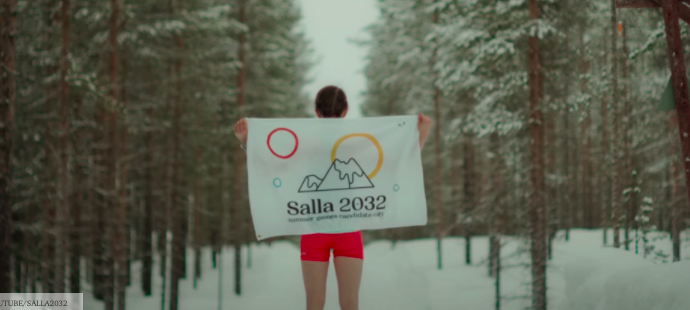Increasingly shorter winter seasons are responsible for fostering a sense of ‘eco-anxiety’ within people working in sport and other climate-vulnerable industries, says Dr Madeleine Orr
From the sound of crackling fire and the hush of foreign dialects, I was hooked. It felt like the start of an apocalyptic movie. At first, I thought it was a joke. But as the promo video progressed, it became clear that it was not funny at all. The video is terrifying.
The Salla 2032 Olympic parody bid is a clever climate awareness campaign. Its message is simple: if climate change progresses, even the coldest, most northern parts of Finland could become summer destinations.
This inconvenient truth did not come as news to me. As a sport ecologist (a person who studies the interactions of sport and the natural environment), I’m intimately familiar with what we stand to lose due to climate change. All the available evidence points to warmer and less predictable winters, putting pond hockey at risk and compromising cross-country skiing.
On the mountain sports side, the outlook is equally bleak: if emissions trends don’t change, we’ll lose most of the skiable area in the US North East and Eastern Canada by the end of the century.
As a Canadian and a lifelong skier, I’ve seen these changes up close: I’ve watched the opening day of my home mountain get pushed further and further into December each year, and closing day is perpetually moved up.
For those working in the ski industry, or in the tourism sector that accompanies it, these changes mean lower incomes overall and less predictable season length. What used to be a lucrative five-month season from late-November to late-April is down to three reliable months from mid-December to mid-March.
These changes are central to the Protect Our Winters refrain, and the organisation’s climate lobbying efforts.
I also know that winter’s loss will be summer’s gain, as the Salla 2032 video insinuates. There could be more opportunities to cycle, play field sports, and enjoy the sunshine. This is nice in theory, especially as the worst storm of the winter rages outside my window here in Montreal. But some cultures, like mine, are built on four seasons with rich and distinct experiences, and winter plays a big part.
The Team Canada slogan, for example, is “ice in our veins”. Some of my country’s most successful sports teams and athletes compete in winter sports. In my community, winter sports are not just about competitions for elite athletes; they’re an economic accelerator in many communities, and a national cultural centrepiece. We can’t just lose winter and pretend it’s not a huge deal. I’m sure the people of Salla feel the same.
The campaign hit a little too close to home and stirred up some eco-anxiety and eco-anger. Eco-anxiety, also known as climate anxiety, is a generalised sense the ecological foundations of existence are collapsing. It can be experienced as a form of non-specific worry about the general state of the planet, or directly related to a specific trigger or event.
In my case, Salla 2032 is the trigger, activating a decade-long generalised sense of worry, urgency, and lack of control that drove me into sport ecology research in the first place. The feeling is not uncommon: most researchers and specialists working in the climate space experience eco-anxiety at some point.
But here’s where it gets interesting: researchers and ‘climate people’ are not the only ones experiencing eco-anxiety at growing rates. Many people working in climate-vulnerable sectors, like agriculture, tourism, and sport, are experiencing growing eco-anxiety. This intuitively makes sense: when your connection to the land, your home, career, sense of self-worth, and sense of happiness are impacted by climate change, it’s not hard to see how that would translate to anxiety over what might happen if and when things get worse. However, studies show eco-anxiety is unlikely to spur a person to act. Instead, it often leads to apathy.
What’s far more potent as a reaction to climate change is eco-anger, which is a sense of frustration, resentment, and anger toward climate change or inaction on climate change. This is the feeling that makes a person want to just do something about it. Eco-anger is known to spur action, whereas eco-anxiety typically inspires apathy and inaction.
It appears this was the response Salla 2032 campaign was going for, or at least, it’s the response they got. Employing a quintessentially Finnish sense of humour and some clever video work, the campaign shows the world exactly what’s at risk, as a tactful way of inspiring eco-anger and climate action. I hope we see more of this in future (the campaigns, not the climate change).
Dr Madeleine Orr is the co-founder of the Sport Ecology Group and the assistant professor of Sport Management at SUNY Cortland










Leave a Comment
Your email address will not be published. Required fields are marked with *